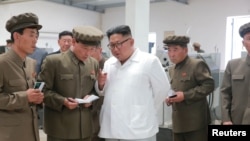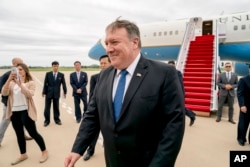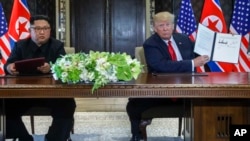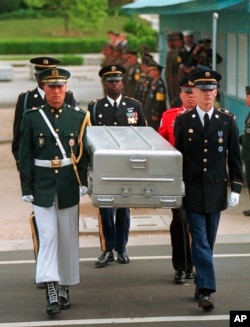The North Korea denuclearization progress has stalled as pressure from economic sanctions appears to be easing, and after U.S. President Donald Trump declared that North Korea is no longer a nuclear threat.
U.S. Secretary of State Mike Pompeo said Wednesday that reaching a denuclearization deal with North Korea “may take some time.” He spoke during a Cabinet meeting with the president and high-ranking members of his administration.
Trump had also said Tuesday that there is “no time limit” to the negotiations, but added Wednesday in a tweet that sanctions would remain in place and there would be big benefits for North Korea at the end of the process.
North Korea analyst Cheong Seong-chang, with the Sejong Institute in South Korea, says the new patient approach by the Trump administration may indicate a growing recognition that its prior demands for rapid and unilateral denuclearization before granting any concessions are unrealistic.
“The United States has started to recognize clearly that it will take a considerable amount of time for North Korea’s complete denuclearization. In this situation, it is very unrealistic to expect North Korea to move forward with the denuclearization process without any compensation for years to come,” Cheong said.
North Korea has called for a more reciprocal approach with economic and diplomatic incentives tied to each phase of the process.
Easing pressure
At the Singapore summit in June, North Korean leader Kim Jong Un met with Trump and reiterated a broad commitment to work toward the complete denuclearization of the Korean Peninsula.
Following the summit Trump tweeted, “There is no longer a nuclear threat from North Korea,” but many analysts said the president’s inflated claims of his achievements had eased pressure on the Kim government to take concrete action.
“The fact that the president has come back and said North Korea is no longer a nuclear problem, without any substantial evidence for that, is going to create a problem now because North Korea will say, ‘we don’t need to do anything,’” said Paul French a commentator on politics in Asia and author of the book North Korea: State of Paranoia.
Subsequent negotiations between Washington and Pyongyang have so far not produced any significant progress. After Pompeo’s last visit to Pyongyang in July, North Korea accused his delegation of making “gangsterlike” demands in calling for compete denuclearization.
Go Myong-Hyun, a North Korea research fellow at the Asian Institute for Policy Studies in Seoul, says the Kim government is still striving to preserve all or parts of its nuclear arsenal, while at the same time pushing to end international sanctions that block 90 percent of the country’s trade, and pursue increased economic development.
“This is the dilemma not just for us but for the North Koreans, how to come up with this balance between nuclear capabilities clearly opposed by all of North Korea’s neighbors whereas at the same time achieve a modicum of economic development,” Go said.
Sanctions evasion
Since the summit, there have been reports of China and Russia informally easing sanctions enforcement on North Korea, along with calls by Beijing and Moscow to reduce the United Nations Security Council imposed ban on the North’s exports including coal, iron, lead, textiles and seafood, and capping imports of crude oil and refined petroleum products. However, the U.S. has indicated it would veto any such measure.
The South Korean government said Thursday that it is investigating reports that Chinese companies illicitly shipped 9,000 tons of North Korean coal through South Korea last year.
“If necessary, penalties will be imposed. This will become a moment to remind the importance of implementing the U.N. Security Council sanctions against North Korea,” said South Korean Foreign Ministry Spokesman Noh Kyu-duk.
The United States also accused North Korea on Thursday of making illicit transfers of oil between ships at sea and demanded an immediate end to all sales of the fuel.
Sanctions evasions may help Pyongyang endure in the short term, but the continued reduction in overall trade and dwindling foreign reserves will likely increase the prospects for either denuclearization progress or renewed provocation in the months to come.
“The economic sanctions are being played out slowly but for sure. This is something that North Korea is not very happy with,” Go said.
Americans’ remains
There also seemed to be a misunderstanding over North Korea’s ability to rapidly return to the United States the remains of some of the American service members killed in the 1950-53 Korean War, which was also agreed to in Singapore. A week after the summit, President Trump claimed the repatriation had already happened, even though it had not.
Part of the reason for the delay is logistics related. Many of the more than 55 sets of remains are in different locations and it will take time for authorities in Pyongyang to collect and verify them.
“It is inevitable that it will take some time, but I think there was a misunderstanding with the United States that North Korea is ready and prepared to return the remains at any time,” said Cheong with the Sejong Institute.
Secretary of State Pompeo said Wednesday that the remains will be returned in the coming weeks.
Lee Yoon-jee in Seoul and Sarah Williams in Washington contributed to this report.








